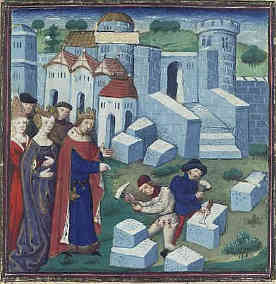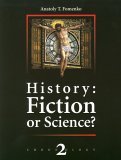 Here
are a couple of Amazon.com Spotlight reviews I wrote about the first
two volumes of Anatoly Fomenko's History:
Fiction or Science?
Here
are a couple of Amazon.com Spotlight reviews I wrote about the first
two volumes of Anatoly Fomenko's History:
Fiction or Science?
By Timothy Horrigan © 2005-2006
 Here
are a couple of Amazon.com Spotlight reviews I wrote about the first
two volumes of Anatoly Fomenko's History:
Fiction or Science?
Here
are a couple of Amazon.com Spotlight reviews I wrote about the first
two volumes of Anatoly Fomenko's History:
Fiction or Science?
The work is projected to run into seven volumes when (and if)
completed.
Dr. Fomenko is a Russian mathematician who has branched out into history. He is a founder of the controversial "New Chronology" movement which essentially states that history only goes back till about 1050 AD. From what we now call the 11th through 15th centuries, there was a Eurasian empire (what we now call the "Byzantine empire") which lasted almost 400 years. In the 15th century, the various remnants of the empire developed their own versions of the story, each with their own nation at the center of the story. These stories were eventually recombined into a single narrative which repeats itself cyclically. I am personally a little skeptical, but I am at least convinced that the conventional chronology is basically fictional, being based on written documents which in almost all cases are much newer than the history they record.
See also:
Official page from the publisher of the first English-language edition (advertising vol. 1)
Fomenko's own web site Chronologia.org (all in Russian)
"New Hypothetical Chronology and Concept of the English History: British Empire as a Direct Successor of Byzantine-Roman Empire". by A.T.Fomenko & G.V.Nosovskij
My April 1, 2009 commentary on Traditional Ptolemaic Astronomy
"A Pretty Wild Theory", February 22, 2005 (5 Stars)
This book presents a wildly radical restructuring of the timeline of world history. It is written by an outsider to the world of historical scholarship: Fomenko is a non-historian (a renowned mathematician) and an non-Westerner (from Russia.) Fomenko's theory says, basically, that everything we are told about history pre-1600 is BS. Ancient history is, according to Fomenko, based on evidence quote-unquote "discovered" since the 15th century and arranged into a spurious standard timeline in the 18th century. (In some cases, the evidence was discovered much more recently: some Eastern religious texts were only uncovered in the 20th century.) Fomenko collates this evidence to argue that all those ancient chronicles are different versions of events which really happened roughly between 1000 AD and 1400 AD. The key event in Fomenko's timeline is the life of Christ (who was born in 1053 AD rather than 6BC, Fomenko believes.) After a relatively short-lived Eurasian empire disintegrated, each nation made up their own version of the empire's history, and generally each new version of the story was set farther back into the past than the previous one. (The newest version is the Hindu Krishna myth which is set about 10,000 years before the present day.)
This is an appealing theory, since it eliminates the various "dark ages" which blemish the conventional chronology.
On the other hand, this is an appalling theory, since it creates one big dark age extending from the beginning of time till 900 AD or so. The book is translated from the Russian. There is no index, and the bibliography is rather annoyingly arranged in the original Russian alphabetical order (so for example, B's and V's are mixed together.) But the translation is extremely readable, more readable than most historical works originally written in English. This is the first book in a projected 7-volume set.
The online bookstore entries for this volume rather amusingly show easily history gets mixed up. The translator is someone named Michael Jagger who is almost certainly not the singer Mick Jagger (whose full name is Michael Phillip Jagger.) However, some online bookstores do list Mick Jagger as a coauthor. Amazon.com says the translator is someone named Mike Jagupov. This is hard enough to keep straight while the singer is still alive, and a few decades from now, I am sure that many sources will say that the legendary Rolling Stones frontman translated this book into English.
(I have no idea if Mick Jagger speaks Russian or not. Although he is an educated man--- an alumnus of the University of London--- one would assume that he doesn't. Certainly, in all the millions of words which have been written about him, no one has commented on his knowledge of the Russian language. And, if he actually was the person who translated this controversial text into English, the book's publishers would presumably be aggressively advertising that fact.)

History:
Fiction or Science? Chronology 2 (Chronology)
"A detailed timeline of classical history--- quite different from the conventional one," July 20, 2005 (5 Stars)
This is the second volume in a projected 7-volume series. It's not quite as much fun as the first volume, where Dr. Fomenko outlined his radical historical theories. This is something of an appendix to volume 1, showing how the timelines of the "First" through "Third" Roman empires, ancient Egypt, ancient Greece, and the Bible are all reflections of events which took place in socalled "Medieval" times. The reason pre-1600 history tends to move in cycles of about 350 years (punctuated by Dark Ages) is, we are told, because there only is about 350 years of pre-1600 history in the first place.
Since I went through the Columbia University's "Contemporary Civilization" program as an undergraduate, I was personally amused to see that two Classical Greek writers who were conventionally viewed as being ancient and historically inaccurate (though still great)— i.e., Homer and Herodotus— are viewed here as being relatively recent and accurate (as well as great.)
Fomenko's timeline becomes even more radical in this book: for example, Fomenko now tells us that Jesus probably lived in the 1100s, not the 1000s. And he was Russian.
We have a few volumes left before Fomenko gets around to British and American history.
There are two more published volumes which I have not written reviews of:
History: Fiction or Science? Astronomical methods as applied to chronology. Ptolemy's Almagest. Chronology III
History:
Fiction or Science? Russia. Britain. Byzantium. Rome. Chronology IV.